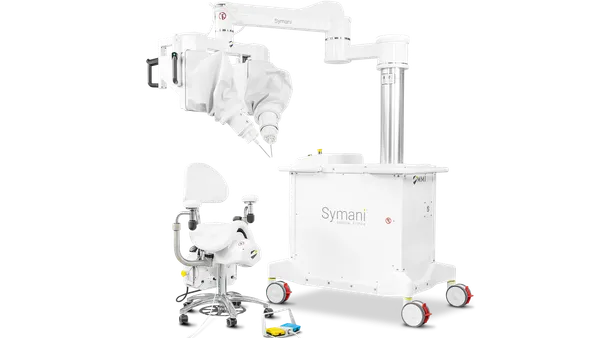Dive Brief:
- Boston Scientific's Acurate neo device for transcatheter aortic valve replacement did not achieve noninferiority in the head-to-head SCOPE II trial with Medtronic's CoreValve Evolut, per results shared at the Transcatheter Cardiovascular Therapeutics virtual event.
- The main shortcoming centered around a higher rate of paravalvular leak among patients receiving the Acurate neo valve. The results come just weeks after Boston Scientific began a European launch of a newer iteration of the device, designed to reduce risk of paravalvular leaking.
- Boston Scientific management said during an investor presentation Thursday at TCT it now expects Acurate neo2 to enter the U.S. market in 2024, well behind an earlier target of 2021. Shares in the medtech closed down 4% on a flat day for the broader market Thursday.
Dive Insight:
Boston Scientific went into last year's TCT event as the newbie in the booming U.S. TAVR market. Having trailed Medtronic and Edwards Lifesciences, the company received FDA approval in April 2019 for its Lotus Edge device for patients with severe aortic stenosis at high risk for surgical valve replacement via open heart surgery.
A few months later, Medtronic and Edwards simultaneously gained FDA approval for their own TAVR devices in the low-risk patient population, vastly expanding their target markets beyond Boston Scientific's allowed indication.
But during its 2019 TCT presentation, Boston Scientific also highlighted its expectation that FDA would approve its Acurate neo2 device in 2021, allowing it to bring an additional valve to the U.S. market. Boston Scientific gained the Acurate neo technology through the 2017 acquisition of Swiss medtech Symetis for $435 million.
Now, Boston Scientific doesn't see that approval happening until 2024. Management explained Thursday that it had originally planned to support a U.S. Acurate neo2 submission with data from the SCOPE I and SCOPE II trials, plus an IDE trial. But after talks with FDA, the company said it needs more patients and more long-term data to support that submission.
Ian Meredith, Boston Scientific's global chief medical officer, also emphasized to investors that the trial compared a first-generation version of a device (Boston Scientific's) to an already repeatedly revised device (Medtronic's).
Some analysts called the stock reaction overblown.
SVB Leerink analyst Danielle Antalffy described Acurate's importance for revenue contribution "relatively marginal" in a note to investors, while Needham analyst Mike Matson wrote that the newer version of the device "should address the shortcomings of Acurate neo and minimize market share loss," and that "Thursday's sell-off was overdone in light of [Boston Scientific's] success with its Lotus Edge TAVR."
Boston Scientific shared additional TAVR business updates during the presentation Thursday, including that Lotus Edge is now in more than 250 accounts around the world and just finished a limited release in key medtech market Japan.
The company's trial of the device in the medium-risk population was disrupted by COVID-19 restrictions, and although it's resumed again, Boston Scientific now does not expect to achieve a U.S. intermediate-risk indication until 2024, five years after its competitors received the low-risk indication.
Besides valves, one area where Boston Scientific continues to make inroads in TAVR is in cerebral protection. Management said its Sentinel system is now being utilized in more than 20% of all U.S. TAVR cases.













